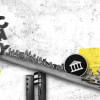One Year Of Ukraine War: Undoing of Bangladesh economy

In the end, it was a war that began some 5,800 kilometres away a year ago that laid bare the longstanding weaknesses of the Bangladesh economy.
Low tax revenue, overreliance on imports, narrow export base, inefficacy of the central bank's monetary policy methodology, interest rate caps, project cost overruns and banking sector weakness are some of the structural problems.
The issues left the country exposed to the wrath of the war, which escalated global commodity prices.
This sparked a cost of living crisis in Bangladesh, drained the central bank's reserves at an alarming rate, compelled the government to go into harsh austerity mode and left the economy mumbling.
Growth has weakened, the taka has depreciated by about 25 percent and reserves have shrunk by about 28 percent, prompting the government to knock at the doors of the International Monetary Fund for support.
But that does not mean that people like Alam Hossen and Al Hossain Chisty can get back to their pre-war lifestyle anytime soon.
Hossain, a diabetic patient, had to switch to rice for sustenance after the wheat price snowballed to an all-time high in the global market with the onset of the Ukraine war.
"The change in diet wrecked my health," said the owner of a small grocery shop at Sirajgang Sadar.
The doctor has advised him to move back to his previous wheat-based diet, which he can ill afford thanks to elevated inflation and the 41.5 percent price hike of loose flour in the past year.
Since the war began on February 24, inflation averaged 8.14 percent, way higher than the reasonable 5 percent.
The elevated price level means Chisty, an SME entrepreneur in Dhaka, is unable to replace his wife's stolen smartphone. that his wife lost her smartphone last week, but he can't buy a new one for her at this moment as his net income has reduced to a large extent.
"My income has reduced greatly. I can't get her a new smartphone. I asked her to use an old feature phone used by my father who died in 2021."
Such intense is his cost of living crisis that he has to entirely cut back on indulgence.
"Before, I used to buy beef twice a month. Now, I can't even buy beef once in two months."
His purchasing power is deteriorating so swiftly that he is concerned about how he will manage his living expenses with his income in the days ahead.
"The prices of most of the commodities have declined in the global market, but our economic woes remain due to our own inherent problems," said Ahsan H Mansur, executive director of the Policy Research Institute of Bangladesh.
The Bangladesh economy has failed to absorb the shock emanating from the war.
The central bank should have withdrawn the interest rate cap of 9 percent on loans and allowed the floating exchange rate immediately after the war started, said Mansur, a former economist of the IMF.
"Had we taken the measures on time, the ongoing worse situation could have been tackled largely. But we have made the situation critical. So there is no scope to blame the war blindly."
If the central bank does not take the issues with the utmost importance, the country will have to face more stress, said Mansur, also the chairman of Brac Bank.
"The macroeconomy has not turned around yet after a year of the war. Rather, its vulnerability may deepen in the coming days," said Selim Raihan, executive director of the South Asian Network on Economic Modeling.
There is no effective policy to restore stability in the foreign exchange market as several exchange rates of dollar-taka are being followed, he said.
Remittances are not rising to their expected level although Bangladesh sent a record number of workers abroad last year.
The government should take strict measures to contain hundi -- an illegal cross-border financial transaction system -- to boost remittances.
"We have not taken any effective measure to stop the illicit money flow. Besides, the country's banking sector is still facing higher amounts of default loans and scams."
The government should implement the recommendations of the IMF properly to restore discipline in the macroeconomic zone, said Raihan, also a professor at the University of Dhaka's economic department.
The war has already created a wide range of instability both at micro- and -macroeconomic levels, said Anu Mohammad, a former professor of Jahangirnagar University's economics department.
The net income of the industrial workers has decreased to 30-40 percent since the inception of the war due to inflation, he said.
The prices of essentials may rise again in the future as there is no sign of the war ending anytime soon, said Binayak Sen, director general of the Bangladesh Institute of Development Studies.

 For all latest news, follow The Daily Star's Google News channel.
For all latest news, follow The Daily Star's Google News channel. 









Comments